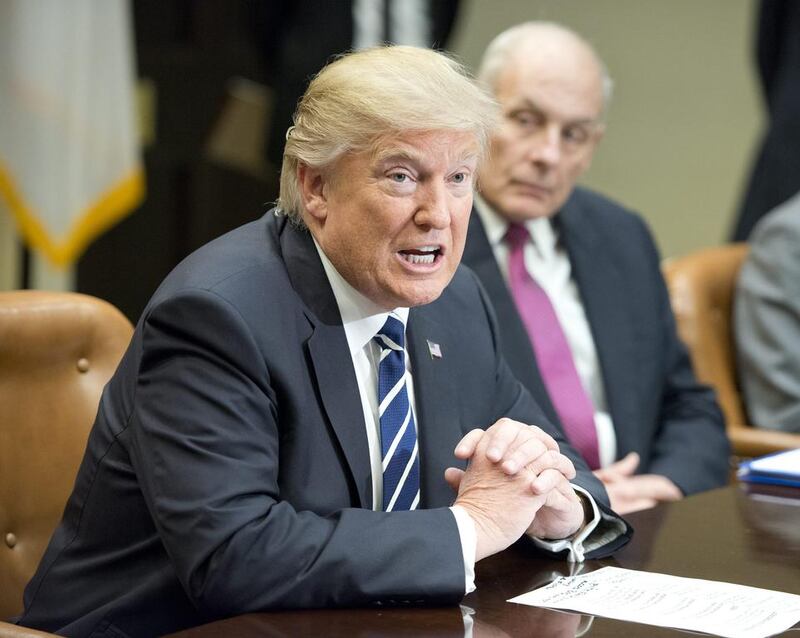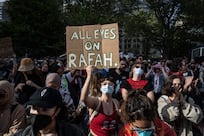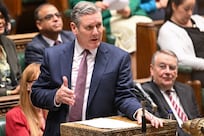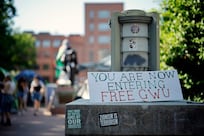One hundred years ago, on February 7, 1917, the United States Congress passed an immigration act that included the notorious Asiatic Barred Zone, a huge area of the world from which migration was banned. The zone stretched from what today is Turkey through the Middle East and Central Asia to Malaysia and Indonesia and beyond. The zone covered the Muslim world apart from Africa, from which continent apparently no migrants were expected at the time.
President Woodrow Wilson sought to veto the bill, but congress overruled him, testifying the strength of “nativist” opinion – those who felt American society and its prosperity were at risk of being overwhelmed by immigrants. To recall this grim centenary serves as a reminder that the welcome to the world’s “huddled masses” promised by the Statue of Liberty was frequently not offered. This seems particularly true of the administration of president Donald Trump, who came to power having promised a total ban on Muslims entering the US “until our country’s representatives can figure out what is going on”.
This campaign pledge has morphed into an open-ended halt to accepting refugees from the Syrian conflict pending a revision of security screening, a 120-day suspension of all refugee arrivals, and a 90-day travel ban on passport holders from seven Muslim-majority countries. Due to its chaotic implementation, the travel restrictions have spread alarm and confusion around the world, dividing families and stranding people with valid entry documents at airports.
Most seriously, it has compromised the US claim to inclusivity by establishing Muslims as potential enemies, in line with the views of Mr Trump’s chief strategist, Stephen Bannon, who believes America is at war with “Islamic fascism”.
Put more simply, Washington seems to be doing the work of ISIL, whose goal is to end the “grey zone” of coexistence where Muslims coexist with non-believers in western society. Mr Trump’s supporters do not see things this way.
They voted to make America “great again and get control of immigration”. They are happy that a document signed in the Oval Office has sent shockwaves around the world. The White House now asserts that the travel restrictions are not anti-Muslim nor do they amount to a travel ban. This is a hard sell: Mr Trump issued a tweet referring to the order as a “ban” and has suggested that Christians will be favoured in asylum applications.
Claims that there is no anti-Muslim intention have been undermined by Rudy Giuliani, the former mayor of New York and an early Trump supporter. Mr Giuliani told a TV interviewer that Mr Trump asked him to form a committee to implement the ban on Muslims that he had promised. Mr Giuliani replied that to discriminate on the grounds of religion would be illegal.
The closest he could get would be to implement the travel ban on the basis of threat, he said. That is why passport holders of Iraq, Syria, Iran, Libya, Somalia, Sudan and Yemen – which were on an Obama administration list of “countries of concern” – were singled out.
A more sophisticated defence of the travel bans holds that what Mr Trump is doing is just a big reality show to prove he is implementing his campaign promise and enforcing “extreme vetting”. In four months normal travel conditions will be restored.
The only long-lasting effect will be that the total number of refugees arriving in the US over the year will drop from the predicted 110,000 to around 50,000.
Things may turn out like that, but this argument ignores the mindset of the Trump White House where there is an apocalyptic sense of doom surrounding the fate of America which can be rescued only by curbing the influence of foreigners.
The Trump persona as revealed in the campaign sees foreign countries as intent on doing America down – China is “raping our country” economically, Mexico is sending its worst criminals over the border and the European Union is a Trojan horse set up to destroy US manufacturing. The mass of Muslim people are now included in this basket of hostile forces. It seems inevitable that the admirable record of accepting refugees is a thing of the past. In 2015, the US admitted 85,000 refugees, almost half of them Muslims, which is a higher proportion than Christians.
The conservative US commentator Christopher Caldwell has pointed out that the opponents of mass immigration will not be satisfied with mere words: “They see the US as a nation-state, not an agency tasked with fulfilling the dreams of Poles or Pakistanis.”
This not just a question of xenophobia; there is harsh political imperative for republicans. The US is becoming a country where the minorities outnumber the white majority. As the democrates draw support from minorities, this signals the death knell for the republicans and all supporters of conservative values.
The idea of illegal immigrants voting is something which seems to keep Mr Trump awake. He has launched an investigation into claims that three million illegal immigrants voted, thus depriving him of a victory in the popular vote, in which Hillary Clinton beat him by a margin of almost 2.9 million votes. Mr Trump revealed that his concerns about illegal voting were prompted by a third-hand anecdote in which it is said that people “who did not look as if they should be allowed to vote” were allowed to cast ballots in Florida.
Mr Trump has been accused on social media of paranoid tendencies about these fictitious illegal voters. But in his view, America is changing, and will be further changed, by mass immigration.
The events of the past week have shown to the public what “people who do not look as if they should be allowed to vote” look like. So the mood of America today is not so different from 1917, even if the passing of a bill as blatantly discriminatory as the Asiatic Barred Zone is unthinkable today.
Alan Philps is a commentator on global affairs





